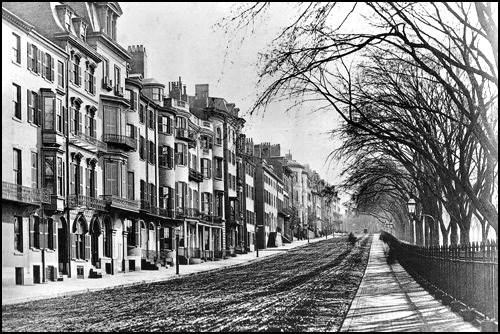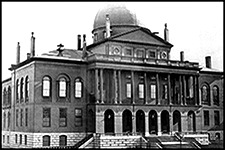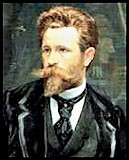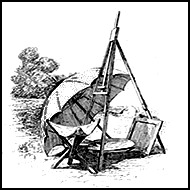

“[W]e spent the evening merrily talking of art and artists, of business affairs, and of works to be published of which I would be the editor and designer.”
“In Paris I was a Parisian, here now I behave as an American. Certain things you don’t do, nor do you talk about them. Here we are a nation of puritans and that is the way we must live, you shall see. You shall see!” (Fellow artist John Ward Dunsmore to Juglaris, Fall, 1880).
“[I]t being Sunday and a holiday the laws do not allow you to do any work at all, not at home nor in public and that we therefore had to go to church instead of hanging around to sketch and paint…we returned home shocked and discouraged with a sense of pity towards that republic so enslaved and dominated by contrary religions.”

Tommaso Juglaris arrived in Boston on Sunday, August 22, 1880. Despite its longstanding reputation as the “Athens of America,” Boston had not entirely escaped its Puritan roots. Moreover, the city was ruled by an elite caste of wealthy “Brahmin” families, who could be very insular in their outlook and less than open to outsiders.

Nevertheless, Juglaris received an initial welcome that seemed entirely warm and sincere. Personally greeting him in person at the train station was none other than his new employer, Louis Prang himself. On a subsequent factory tour, Prang explained Juglaris's forthcoming duties. As artistic director, Juglaris would be responsible for selecting, revising, and even redoing all artwork. That night a Prang associate hosted a dinner at his home with Juglaris as honored guest. Full of talk about future projects, the evening was both congenial and auspicious. Juglaris was elated. The night seemed to validate every hope he had for a bright future in America.

After settling into lodgings near the Boston Commons and starting work at the Prang factory, Juglaris tried to look up two Boston residents he had known well back in France when they were all part of Thomas Couture’s circle at Villiers-le-Bel. Francis “Frank” Millet did not respond to his inquiries, but Juglaris was able to meet with young John Ward Dunsmore. Although in Paris Dunsmore had led a free-and-easy life complete with a mistress, he was now a very proper man. In his new role as Boston society painter, always trolling for portrait commissions among the city’s matrons, he was impeccably dressed and morally circumspect, not even willing to acknowledge that he drank anymore. Dunsmore warned Juglaris about Boston’s puritanical ways. “You shall see!” he said. Before long, Juglaris did see, learning first-hand what Dunsmore was talking about.

With his duties at the Prang firm limited to four hours per day, Juglaris was committed to devoting the rest of his time to painting “some works of art to exhibit and make myself known” to the Boston art world. One Sunday morning, inspired by the spectacular beauty of a New England autumn, Juglaris and a fellow artist from Prang, who could speak only a little more English than he did, travelled to nearby Brookline to paint the colorful fall foliage. They had barely set up their easels when a policeman accosted and arrested them. Hauled to a police station, Juglaris and his companion were promptly informed that working on Sunday was against the law. Fortunately, the pair was released with just a warning. But Juglaris was astonished that such Sunday restrictions should exist at all. Even more absurd was the notion that creating art was considered manual labor in Boston! According to Juglaris, his arrest in Brookline was the talk of Boston the next day.
That was not the last time Juglaris ran afoul of Boston's “Blue Laws.” Neighbors called police after overhearing him--in the privacy of his own quarters--wielding a hammer on a Sunday, unpacking cases containing his Paris Salon paintings. Juglaris quickly learned that in Boston he was not even the master of his own castle on the Sabbath.